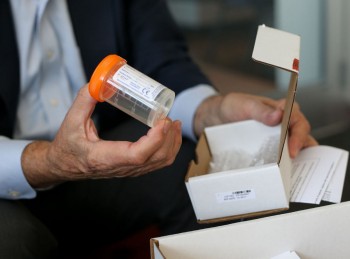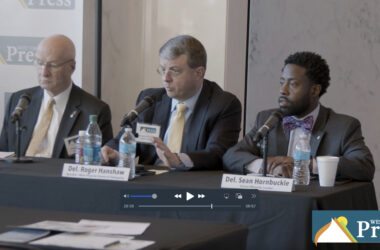
Dr. Terry Fenger, director of the Forensic Science Center, discusses the contents of a rape kit during a tour of the facility on Wednesday, Aug. 31, 2016, in Huntington.
HUNTINGTON, W.Va. — Since beginning a partnership with the Marshall University Forensic Science Center in 2013 to identify and screen the department’s backlogged sexual assault kits, the Huntington Police Department has processed and logged 245 previously untested kits collected between 1995 and 2013.
Huntington police are now seeking consent from sexual assault victims to further analyze the recently screened kits in order to move forward with potential criminal prosecutions, Chief Joe Ciccarelli said in a release Thursday.
In the immediate aftermath of a sexual assault, Ciccarelli said, some victims who undergo a sexual assault kit decline to pursue criminal charges. In such cases, the kit would remain logged, but not screened or entered into the Combined DNA Index System, the national DNA database maintained by the FBI.
All of HPD’s backlogged sexual assault kits have now been screened through the project, Ciccarelli said. With the passage of time, he said, victims who completed a kit but declined to move forward with an investigation may now want to pursue criminal charges, a choice that can legally only be made with the consent of the victim. There is no statute of limitation for prosecution of sex offenses in West Virginia.
“We at the Huntington Police Department realize the potential for emotional impact to the victims and the community of reopening cases that may be more than a decade old,” Ciccarelli said in the release. “We also realize that victims and their families could have many questions. That’s why we have partnered with the CONTACT Rape Crisis Center, a local, community-based advocacy agency, and a victim specialist from the FBI to assist victims with questions, information and support.”
West Virginia has been struggling to eliminate a large backlog of untested sexual assault kits, and in 2013 it started with two counties, Cabell and Monongalia, two of the state’s most populous counties. As of last month, 558 kits – including those from Huntington police – dating back at least 16 years have been tested in those counties.
For the next 16 counties in line for testing, it is estimated 2,000 more kits will be reported. A testing timetable for the state’s remaining 37 counties has not been set. It is not known how many kits may be awaiting testing in those counties.
Follow reporter Bishop Nash on Twitter @BishopNash.






